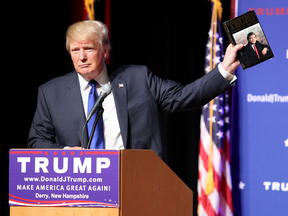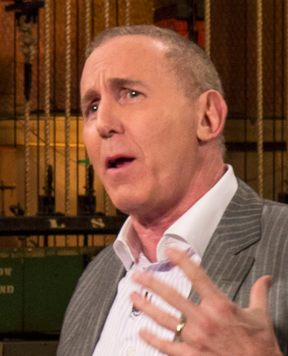Art of the Deal Writer About Trump Black Hole You Tube
Tony Schwartz: I wrote The Art of the Deal with Donald Trump. His cocky-demolition is rooted in his by
The more he feels at the mercy of forces he cannot control — and he is surely feeling that now — the more resentful, desperate and impulsive he becomes

Why does Donald Trump bear in the dangerous and seemingly cocky-destructive ways he does?
Three decades ago, I spent nearly a year hanging effectually Trump to write his first book, The Fine art of the Deal, and got to know him very well. I spent hundreds of hours listening to him, watching him in action and interviewing him virtually his life. For me, none of what he has said or done over the past four months as president comes as a surprise. The style he has behaved over the past week — firing FBI Managing director James Comey, undercutting his own aides as they tried to explain the conclusion and so disclosing sensitive information to Russian officials — is also entirely predictable.
Early on, I recognized that Trump'due south sense of self-worth is forever at risk. When he feels aggrieved, he reacts impulsively and defensively, constructing a self-justifying story that doesn't depend on facts and always directs the blame to others.
The Trump I start met in 1985 had lived nearly all his life in survival style. Past his own clarification, his father, Fred, was relentlessly demanding, difficult and driven. Hither'southward how I phrased information technology in The Art of the Deal: "My father is a wonderful human, only he is besides very much a business organization guy and potent and tough as hell." Every bit Trump saw it, his older brother, Fred Jr., who became an alcoholic and died at 42, was overwhelmed by his father. Or as I euphemized it in the book: "There were confrontations between them. In almost cases, Freddy came out on the short end."
Trump's worldview was profoundly and self-protectively shaped past his father. "I was drawn to business very early on, and I was never intimidated by my male parent, the way most people were," is the way I wrote it in the volume. "I stood up to my father and he respected that. We had a relationship that was nearly businesslike."
To survive, I concluded from our conversations, Trump felt compelled to become to war with the earth. It was a binary, nada-sum choice for him: You lot either dominated or yous submitted. You either created and exploited fear or you lot succumbed to it — as he thought his older brother had. This narrow, defensive worldview took hold at a very early age, and it never evolved. "When I expect at myself today and I look at myself in the get-go grade," he told a recent biographer, "I'one thousand basically the same." His development essentially concluded in early babyhood.
-

Donald Trump complains that 'no political leader in history has been treated worse or more unfairly'
-
Anne Applebaum: Guess what? The experts were right later all. Donald Trump is not fit to be president
-

Memo by fired FBI head James Comey says Trump pressured him to end Michael Flynn probe
Instead, Trump grew upwardly fighting for his life and taking no prisoners. In countless conversations, he made information technology clear to me that he treated every encounter equally a contest he had to win, because the only other option from his perspective was to lose, and that was the equivalent of obliteration. Many of the deals in The Art of the Deal were massive failures — among them the casinos he owned and the launch of a league to rival the National Football League — only Trump had me draw each of them as huge successes.
With axiomatic pride, Trump explained to me that he was "an assertive, aggressive" kid from an early age and that he had one time punched a music teacher in the eye and virtually been expelled from unproblematic school for his behavior.
Who knows whether that story, like so much about Trump, is true? What'southward clear is that he has spent his life seeking to dominate others, whatever that requires, and any collateral damage information technology creates forth the way. In The Fine art of the Bargain, he speaks with street-fighting relish nigh competing in the world of New York real estate: "They are some of toughest, and most vicious people in the world. I happen to love to go up against them, and I love to trounce them." I never sensed from Trump any guilt or contrition most anything he'd done, and he certainly never shared any misgivings publicly. From his perspective, he operated in a jungle full of predators who were forever out to get him, and he did what he must to survive.
Trump was every bit clear with me that he didn't value — nor even necessarily recognize — the qualities that tend to emerge every bit people grow more secure, such as empathy, generosity, reflectiveness, the chapters to delay gratification or, in a higher place all, a conscience, an inner sense of right and wrong. Trump simply didn't traffic in emotions or interest in others. The life he lived was all transactional, all the time. Having never expanded his emotional, intellectual or moral universe, he has his story downwards, and he's sticking to information technology.
A key part of that story is that facts are whatever Trump deems them to exist on any given mean solar day. When he is challenged, he instinctively doubles down — fifty-fifty when what he has just said is demonstrably simulated. I saw that endless times, whether it was every bit trivial as exaggerating the number of floors at Trump Tower or equally consequential as telling me that his casinos were performing well when they were actually going bankrupt. In the aforementioned manner, Trump sees no contradiction at all in changing his story near why he fired Comey and then undermining the explanatory statements of his aides, or in any other lie he tells. His aim is never accurateness; information technology's domination.

Trump derives his sense of significance from conquests and accomplishments. "Tin you believe it, Tony?" he would oft begin late-night conversations with me, and then become on to describe some new example of his luminescence. But the reassurance he got from even his biggest achievements was ever ephemeral and unreliable — and that appears to include being elected president. On the confront of information technology, Trump has more than opportunities now to feel significant and accomplished than almost any human being on the planet. But that's like saying that a heroin addict has his problem licked once he has free and continuous access to the drug. Trump as well now has a far bigger and more public stage on which to neglect and to feel unworthy.
Whatsoever addiction has a predictable pattern — the addict keeps chasing the high past upping the ante in an increasingly futile try to re-create the desired state. From the very first time I interviewed him in his office in Trump Belfry in 1985, the image I had of Trump was that of a black hole. Any goes in quickly disappears without a trace. Nothing sustains. Information technology's forever uncertain when someone or something volition throw Trump off his precarious perch — when his sense of equilibrium will be threatened and he'll feel an overwhelming coercion to restore it. Below his bluff exterior, I e'er sensed a hurt, incredibly vulnerable little boy who but wanted to be loved.
What Trump craves most deeply is the applause he has constitute and then imperceptible. This goes a long mode toward explaining his need for control and why he simply couldn't bide Comey, who reportedly refused to accede to Trump's need for loyalty and whose continuing investigation into Russian interference in the election campaign terminal year threatened to bring downwards his presidency. Trump's demand for unquestioning praise and flattery also helps to explain his hostility to democracy and to a free press — both of which thrive on open up dissent.
Equally we saw endless times during the campaign and since the election, Trump can devolve into survival mode on a moment'south notice. Look no further than the thousands of tweets he wrote attacking his perceived enemies over the past year. In neurochemical terms, when he feels threatened or thwarted, Trump moves into fight-or-flight style. His amygdala gets triggered, his hypothalamic-adrenal-pituitary centrality activates, and his prefrontal cortex — the function of the brain that makes united states capable of rationality and reflection — shuts down. He reacts rather than reflects, and damn the consequences. This is what makes his access to the nuclear codes so dangerous and frightening.
The Trump I got to know had no deep ideological beliefs, nor any passionate feeling about anything but his immediate self-interest.
Over the past calendar week, in the face up of criticism from nearly every quarter, Trump's distrust has almost palpably mushroomed. No importuning by his advisers would stand a chance of constraining him when he feels this deeply triggered. The more than he feels at the mercy of forces he cannot control — and he is surely feeling that now — the more resentful, drastic and impulsive he becomes.
The Trump I got to know had no deep ideological beliefs, nor any passionate feeling well-nigh anything but his immediate self-interest
Fifty-fifty xxx years later, I vividly remember the ominous feeling when Trump got aroused about some perceived slight. Everyone effectually him knew that y'all were best off keeping your altitude at those times, or, if that wasn't possible, to resist disagreeing with him in any way.
In the hundreds of Trump's phone calls I listened in on with his consent, and the dozens of meetings I attended with him, I tin can never remember anyone disagreeing with him about anything. The aforementioned climate of fear and paranoia appears to accept taken root in his White Business firm.
The most recent time I spoke to Trump — and the first such occasion in virtually three decades — was July 14, 2016, shortly before the New Yorker published an article by Jane Mayer about my feel writing The Art of the Deal. Trump was just almost to win the Republican nomination for president. I was driving in my car when my cellphone rang. It was Trump. He had just gotten off a call with a fact-checker for the New Yorker, and he didn't mince words.
"I merely want to tell you that I think yous're very disloyal," he started in. Then he berated and threatened me for a few minutes. I pushed back, gently but firmly. And then suddenly, as abruptly as he began the telephone call, he ended it. "Accept a prissy life," he said, and hung up.
Tony Schwartz is the master executive officer of the Energy Project, which helps companies tap more of people'due south capacity by amend meeting their core needs and so they tin can perform more than sustainably. He is the author, most recently, of The Manner We're Working Isn't Working.
Source: https://nationalpost.com/opinion/tony-schwartz-i-wrote-the-art-of-the-deal-with-donald-trump-and-none-of-his-behaviour-as-president-is-surprising
